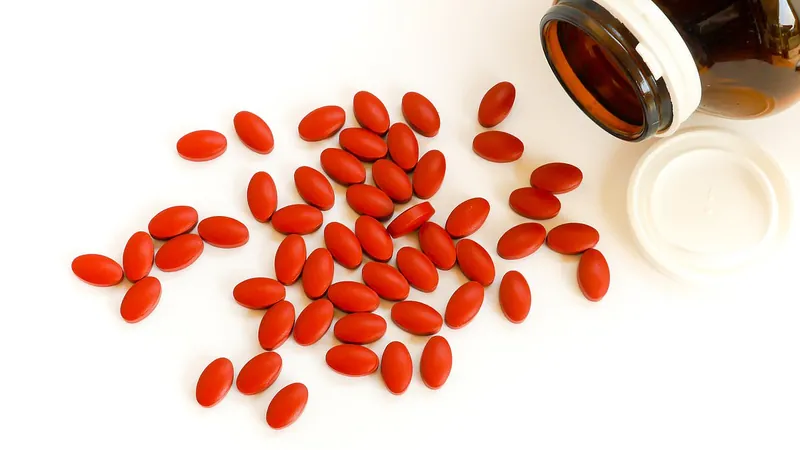
Are You Taking Iron Supplements Correctly? Doctor Issues Urgent Warning About Colon Cancer Risks!
2025-01-13
Author: Yan
Introduction
Many people across the UK are turning to dietary supplements, with nearly half of Brits reportedly taking them at least once a month in their quest for optimal health. However, a prominent doctor has raised alarms about the potential dangers of one of the most commonly used supplements—iron.
The Risks Associated with Iron Supplements
Dr. Ahmed Abd Elbary, a UK-based GP, cautions that consuming certain iron supplements more than once a day could lead to severe gastrointestinal issues such as diarrhea, constipation, and bowel inflammation. These complications can potentially contribute to serious conditions like Crohn's disease and ulcerative colitis. In a viral TikTok video that has garnered almost 550,000 views, he outlined the significant risks associated with improper iron supplementation.
Links Between Iron and Bowel Cancer
Research indicates that excessive iron intake may elevate the risk of developing bowel cancer—a disease that claims nearly 17,000 lives in the UK each year, with increasing cases among those under 50. The consequences of overconsumption are alarming: the risk factors may include oxidative damage to cells, adding to the urgency of heeding proper dosing guidelines.
Recommended Iron Intake
Dr. Elbary explains that many people are often prescribed iron wrong. "This should be taken once a day—never twice, and sometimes even an every-other-day schedule is adequate," he advised. The doctor elaborated that taking iron initiates the production of a protein called hepcidin, which hinders the absorption of iron into the bloodstream from the gut. After one dose, additional iron consumed within 24 hours can lead to harmful accumulation in the intestinal tract, causing inflammation and disrupted microbiome balance.
Daily Iron Requirements
The NHS recommends that men consume about 8.7mg of iron daily, while women aged 19-49 should aim for 14.8mg. For women over 50, this requirement drops to about 8.7mg due to the cessation of menstrual periods. Ensuring you meet these daily iron requirements is crucial, as iron plays a vital role in producing red blood cells and transporting oxygen throughout the body, directly impacting energy levels, digestive health, and immune function.
Iron Sources in Diet
Iron supplements, commonly sold at pharmacies for as little as £2.50, typically contain around 14mg of iron per tablet. However, healthcare professionals emphasize that a balanced diet rich in iron—found in red meats, pulses, and leafy green vegetables like spinach and kale—can provide sufficient intake for most individuals.
Health Complications from Excess Iron
Overindulging in iron can lead to numerous health complications that extend beyond gastrointestinal distress: it can trigger serious conditions like cirrhosis, diabetes, heart failure, and even impact sexual health and menstrual cycles. Alarmingly, recent studies suggest a worrisome correlation between excess iron and an increased risk of bowel cancer due to cellular oxidative damage.
Bowel Cancer Trends in the UK
In the UK alone, there are approximately 44,000 new bowel cancer cases each year, with the disease emerging as the fourth most common cancer—an alarming trend that is increasingly affecting younger demographics. Factors such as modern dietary choices, environmental exposures, and lifestyle habits have been noted as contributors to this rising trend.
Symptoms of Bowel Cancer
Symptoms of bowel cancer often manifest as persistent changes in bowel habits, abdominal pain, bloating, and unexplainable weight loss among others. Those experiencing any concerning symptoms are encouraged to seek medical advice promptly.
Preventing Bowel Cancer
Despite the grim statistics, Cancer Research UK estimates that more than half of bowel cancer cases could be preventable, highlighting the importance of awareness and proactive health management. Experts cite factors like obesity, overuse of antibiotics, and environmental toxins as significant threats to gut health and overall well-being, prompting calls for better public education around nutrition and supplement use.
Conclusion
In light of these findings, it is vital for individuals relying on iron supplements to consult their healthcare providers to ensure they are informed about the safest and most effective usage. Don’t let your quest for health turn into a risk—get the facts and protect your gut health today!





 Brasil (PT)
Brasil (PT)
 Canada (EN)
Canada (EN)
 Chile (ES)
Chile (ES)
 Česko (CS)
Česko (CS)
 대한민국 (KO)
대한민국 (KO)
 España (ES)
España (ES)
 France (FR)
France (FR)
 Hong Kong (EN)
Hong Kong (EN)
 Italia (IT)
Italia (IT)
 日本 (JA)
日本 (JA)
 Magyarország (HU)
Magyarország (HU)
 Norge (NO)
Norge (NO)
 Polska (PL)
Polska (PL)
 Schweiz (DE)
Schweiz (DE)
 Singapore (EN)
Singapore (EN)
 Sverige (SV)
Sverige (SV)
 Suomi (FI)
Suomi (FI)
 Türkiye (TR)
Türkiye (TR)
 الإمارات العربية المتحدة (AR)
الإمارات العربية المتحدة (AR)